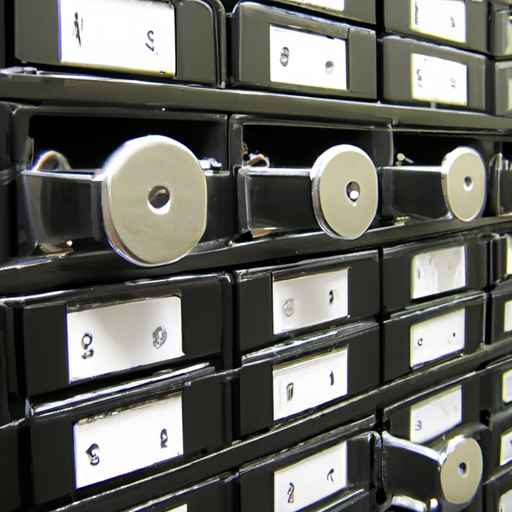As a business owner in the food industry, it is crucial to understand the importance of data retention compliance. In a digital world where information is constantly being shared and stored, businesses must take the necessary steps to protect and manage their data in accordance with legal requirements. This article will explore the key aspects of data retention compliance for the food industry, including the reasons why it is essential, the potential consequences of non-compliance, and the steps that businesses can take to ensure they are meeting their obligations. By gaining a comprehensive understanding of data retention compliance, you can safeguard your business against legal risks and maintain the trust of your customers.
Data Retention Compliance for Food Industry
In today’s digital age, data retention compliance has become a critical aspect of business operations. It refers to the practice of storing and maintaining data for a specific period of time to meet legal, regulatory, and operational requirements. For businesses in the food industry, data retention compliance ensures that important information related to food safety, quality control, and customer transactions is properly managed and preserved.
What is Data Retention Compliance?
Data retention compliance involves the proper retention and disposal of data in accordance with relevant laws and regulations. It ensures that businesses can demonstrate their adherence to legal requirements and maintain the integrity of their records. In the context of the food industry, data retention compliance is particularly important due to the sensitive nature of food safety and regulatory requirements.
Importance of Data Retention in the Food Industry
Data retention is of utmost importance in the food industry for several reasons. First and foremost, it helps businesses meet regulatory requirements and demonstrate compliance with food safety standards. By retaining relevant data, businesses can provide evidence of proper food handling, storage, and distribution practices.
Furthermore, data retention enables businesses to track and trace the origin of food products, ensuring accountability throughout the supply chain. In the event of a product recall or foodborne illness outbreak, accurate and complete records can be crucial in identifying the source of the issue, minimizing its impact, and protecting public health.
Data retention also plays a crucial role in quality control and product development. By analyzing historical data, businesses can identify trends, assess the effectiveness of processes, and make informed decisions to improve overall operations and customer satisfaction.

Legal Requirements for Data Retention in the Food Industry
The food industry is subject to various legal requirements concerning data retention. These requirements may vary depending on the jurisdiction and the specific nature of the business. Some common legal requirements include:
-
Food Safety Regulations: Many countries have specific regulations that require businesses in the food industry to retain data related to food safety. This may include records of temperature monitoring, sanitation practices, pest control, and employee training.
-
Product Labeling and Packaging: Food businesses are often required to retain records related to product labeling and packaging. This ensures compliance with labeling requirements, expiration dates, and ingredient lists.
-
Transaction Records: Businesses in the food industry are typically required to retain transaction records, such as invoices, receipts, and sales data. This facilitates proper accounting, tax compliance, and financial reporting.
-
Employee Records: Data retention requirements also extend to employee records, including employment contracts, payroll information, and training records. This aids in ensuring compliance with labor laws and regulations.
It is essential for businesses in the food industry to consult with legal professionals who specialize in data retention compliance to ensure they are meeting all relevant legal requirements.
Understanding Personal Data in the Food Industry
While the food industry may not typically handle large amounts of personal data like other sectors, it is essential to understand the concept of personal data and its implications. Personal data refers to any information that can directly or indirectly identify an individual. In the food industry, personal data may include customer information, such as names, contact details, dietary preferences, and purchase history.
Businesses must handle personal data in accordance with applicable data protection laws, such as the General Data Protection Regulation (GDPR) in the European Union. This entails obtaining proper consent for data collection and processing, implementing appropriate security measures to protect personal data, and ensuring individuals’ rights regarding their data are respected.
Establishing Data Retention Policies and Procedures
To achieve data retention compliance, businesses in the food industry should establish comprehensive data retention policies and procedures. These should outline:
-
Retention Periods: Clearly define how long different types of data should be retained based on legal requirements, industry best practices, and operational needs. Retention periods may vary depending on the nature of the data, such as food safety records, transaction data, and employee records.
-
Data Disposal Methods: Establish protocols for the secure disposal of data once its retention period has expired. This may involve shredding physical documents or implementing secure data erasure techniques for electronic records.
-
Data Security Measures: Implement robust data security measures to safeguard stored data from unauthorized access, loss, or corruption. This may include encryption, access controls, firewalls, and regular security audits.
-
Staff Training and Awareness: Provide training and education to employees regarding data retention policies and procedures. This will ensure that everyone is aware of their responsibilities and understands the importance of data protection and compliance.
Implementing Data Protection Measures
In addition to data retention policies and procedures, businesses in the food industry should prioritize data protection measures to prevent unauthorized access or data breaches. This includes:
-
Data Encryption: Implement encryption for sensitive data, both during storage and transmission. Encryption adds an additional layer of security and ensures that even if data is compromised, it is unusable without the encryption key.
-
Access Controls: Implement strict access controls to limit access to sensitive data to authorized personnel only. This may involve assigning unique user accounts and passwords, as well as implementing multi-factor authentication.
-
Regular Data Backups: Perform regular backups of essential data to ensure its availability in case of data loss or system failure. Backups should be stored securely, preferably in an off-site location.
-
Regular Security Audits: Conduct regular security audits and penetration testing to identify vulnerabilities and address them promptly. This helps businesses stay ahead of emerging threats and ensure their data protection measures are up to date.

Consequences of Non-Compliance with Data Retention Regulations
Non-compliance with data retention regulations in the food industry can have severe consequences for businesses. Some potential consequences include:
-
Fines and Penalties: Regulatory authorities may impose significant fines and penalties for non-compliance with data retention regulations. These fines can vary depending on the jurisdiction and the severity of the violation.
-
Reputational Damage: Non-compliance can tarnish a business’s reputation, leading to a loss of customer trust and loyalty. This can have long-lasting effects on the success and growth of the business.
-
Legal Action: Non-compliance may result in legal action by affected individuals or regulatory bodies. This can lead to costly legal proceedings, settlements, and potential damages.
Businesses must prioritize data retention compliance to mitigate these risks and ensure the long-term viability and success of their operations.
Data Breach Response and Notification
In the unfortunate event of a data breach, businesses in the food industry must have a well-defined plan for responding to and notifying affected individuals. This may include:
-
Containment and Investigation: Upon discovering a data breach, it is essential to take immediate steps to contain the breach and launch an investigation to determine the extent of the breach and the potential impact on individuals.
-
Notification: Once the investigation is complete, affected individuals should be promptly notified of the breach. The notification should include information about the breach, potential risks, and steps individuals can take to protect themselves.
-
Remediation: Businesses should take appropriate measures to remediate the breach and prevent similar incidents in the future. This may involve strengthening security measures, implementing additional safeguards, and offering assistance to affected individuals, such as credit monitoring services.

Best Practices for Data Retention Compliance in the Food Industry
To ensure data retention compliance in the food industry, businesses should consider the following best practices:
-
Stay Updated: Stay informed about relevant laws, regulations, and industry standards related to data retention compliance. Regularly review and update data retention policies and procedures to align with any changes in the legal landscape.
-
Consult Legal Professionals: Seek guidance from legal professionals with expertise in data retention compliance to ensure your business is fully compliant with all legal requirements.
-
Training and Awareness: Provide regular training and awareness programs for employees to ensure they understand their responsibilities regarding data retention and protection.
-
Regular Audits: Conduct regular internal audits to assess the effectiveness of data retention policies and procedures and identify any areas for improvement.
-
Document Everything: Keep thorough records of data retention activities, including the rationale for retention periods, data disposal methods, and security measures implemented. This documentation can serve as evidence of compliance in the event of an audit or legal action.
Frequently Asked Questions
-
Do small businesses in the food industry also need to comply with data retention regulations? Yes, regardless of the size of the business, all food industry businesses are required to comply with data retention regulations. The specific requirements may vary depending on the jurisdiction and the nature of the business, but compliance is essential for all.
-
What are the potential consequences of mishandling personal data in the food industry? Mishandling personal data in the food industry can result in reputational damage, fines, penalties, and legal action. It is crucial to handle personal data with utmost care and in compliance with applicable data protection laws.
-
What steps should be taken if a data breach occurs in a food industry business? In the event of a data breach, businesses should first contain the breach, launch an investigation, and then promptly notify affected individuals. Remediation measures should be implemented, and assistance should be offered to affected individuals, such as credit monitoring services.
-
How often should data retention policies and procedures be reviewed and updated? Data retention policies and procedures should be regularly reviewed and updated to ensure compliance with changing laws, regulations, and industry standards. It is recommended to conduct reviews at least annually and whenever there are significant changes in the regulatory landscape.
-
Can data retention compliance help improve overall operations in the food industry? Yes, data retention compliance can help businesses in the food industry improve overall operations. By analyzing historical data, businesses can identify trends, assess the effectiveness of processes, and make informed decisions to enhance food safety, quality control, and customer satisfaction.
